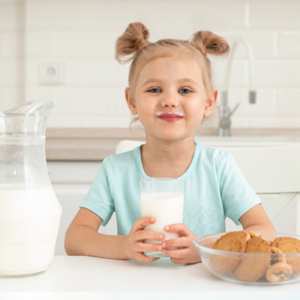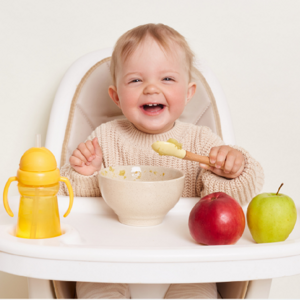Search

What to feed a 6-8 month old?
Below are a list foods you can offer your 6-8 month old baby:
•Pureed fruits (banana, pears, cooked apple, peaches, avocado)

When to start solids?
At the age of 6 months; the introduction of complementary feeding becomes crucial to help fulfill the increased nutritional needs (energy, vitamins and minerals) to help your baby grow and develop

Does Cerelac contain Preservatives?
At Nestlé, the health and safety of our consumers are a top and non-negotiable priority.

It is recommended to follow the below table based on Cerelac stage and your baby age :

Benefits of Optimized PROTEIN
Protein is one of the most important nutrients for our children's growth, especially
during the early stage of their lives, which is the most important period of physical and

What is HMO and what are their benefits?
HMOs are a type of oligosaccharides produced by the mammary glands and found naturally only in breast milk.

Breastmilk superiority
Breastfeeding is the best for our children. It has many benefits, not only for the child but also for the mother.

Nutrition for Children: Breast Milk & Growing Up Milk
Good nutrition in the early stage of our children's lives is critical, because it is the foundation for what will continue with them for the rest of their lives.

Let's focus on The Immunity....
We want to remind every mother that immunity is essential for protection, and is considered as the first line of defense against diseases and external infections

So, what is the role of Probiotics?
Probiotics are bacteria that are beneficial to the digestive system

HOW DOES ILLUMA 3 SUPPORT digestive health?
- Nurturing your child's digestive health is particularly important during the first years of life
- That's why ILLUMA 3 also contains oligofructose

My baby is not accepting the food and doesn’t want to eat, what can I do?
"It is normal for babies to reject the same food they previously accepted, as studies have proven that a child can refuse a certain food 8-15 times before they start to accept it.

Cerelac caused my baby an allergic reaction, what can I do?
If you suspect any kind of allergies; we highly recommend that you consult with your baby's pediatrician for advice.

What can I do as my baby is rejecting the food that he\she used to like at the beginning?
"It is normal for babies to reject the same food they previously accepted, as studies have proven that a child can refuse a certain food 8-15 times before they start to accept it.

Do Cerelac contain a large amount of sugar?
“At 6 months of age; the introduction of solid food because crucial to help fulfill the increased nutritional needs (energy, vitamins, minerals) to help your baby grow and develop properly.

CERELAC® Variants in the Middle-East
Below are the Cerelac® variants in the Middle East:
Infant Cereals
My 1st Cereal from 6 months:
• Cerelac Rice.

Why are we adding B. lactis to NESTLÉ® CERELAC®?
The introduction of complementary food modifies the gut microbiota: the bifidobacteria level in the gut is reduced and that may lead to an increased risk of gastrointestinal infections.

What is the difference between probiotics and prebiotics?
A probiotic is a live, naturally-occurring microorganism that functions internally to promote health and wellbeing.

Why does the probiotic B. lactis support the concept of “strengthening natural defenses” better than a prebiotic?
A probiotic directly influences the microbiota and the mucosal barrier to strengthen the natural defenses.

What is Bifidus BL?
Bifidus BL is a probiotic similar to those found in the digestive system of breastfed babies.

What are Immunonutrients?
Immunonutrients are key vitamins and minerals that actively participate in the good functioning of your baby's immune system.

Is there any harm in adding breastmilk to CERELAC®?
Cerelac® contains both cereal grains and milk with complementary vitamin/mineral content to provide a nutritionally balanced meal.

Does CERELAC® cause Gas or other digestive problems?
CERELAC® contains BIFIDUS BL which are probiotics found in breast milk and have been clinically proven to help keep your baby’s intestinal flora healthy and thus reducing the incidence of diarrhea

How can I prepare one serving of CERELAC®?
To prepare one serving of CERELAC® please follow this tips:

Why is CERELAC® a great choice and an essential part of a balanced weaning diet for your baby?
CERELAC® can be the right choice for healthy well – balanced weaning diet for the following reasons:

Can CERELAC® substitute breast milk
CERELAC® is not a breast milk substitute but is suitable as a complementary food for infants from 6 months onwards, when breast milk alone no longer meets the baby’s growing nutritional requirement

Raw Honey
Please rest assured that the health and safety of our consumers is our top priority.

Raw Honey
Please rest assured that the health and safety of our consumers is our top priority.

CERELAC contains Animal Resource
Please note that Nestlé has a clear internal policy to list all the ingredients on the label of any Nestlé product to enable the consumers to read these ingredients.

How long does COVID-19 survive on surfaces?
We do not yet know exactly how long COVID-19 survives on different types of surfaces but it is possible that this may vary from a few hours to several days under different conditions (e.g.

Is it safe to receive a package from a COVID-19 area?
Many of us find that we are ordering more food and daily necessities to our home than before to avoid going out.

Will Antibiotics help protect me and my child from COVID-19?
No! Do not take antibiotics for COVID-19 as these are not effective for treating viruses and may be harmful if used inappropriately.

